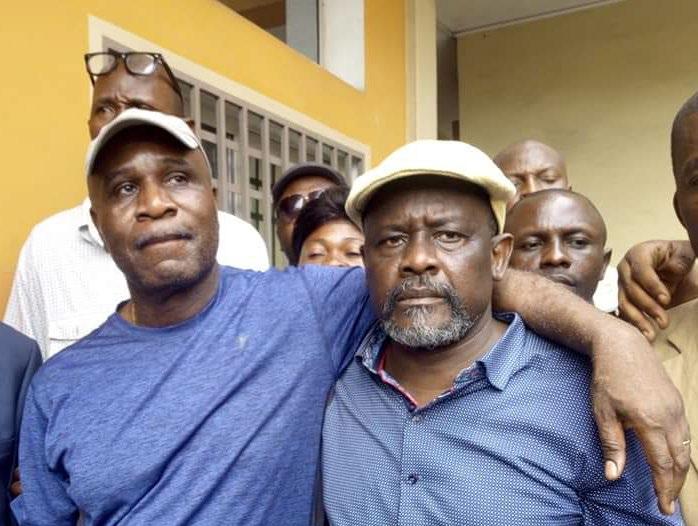
3 minute read
Democratic Republic of the Congo
from Inter-Parliamentary Union's Decision of the Committee on the Human Rights of Parliamentarians - 170t
Decision adopted by the Committee on the Human Rights of Parliamentarians at its 170th session (Geneva, 21 January to 2 February 2023)
COD-71 – Eugène Diomi Ndongala
Advertisement
Alleged human rights violations
Lack of due process at the investigation stage
Lack of fair trial proceedings
Right of appeal
Violation of freedom of opinion and expression
Violation of freedom of movement
A. Summary of the case
Mr. Ndongala has been subjected to a campaign of political and legal harassment aimed at removing him from the political process since June 2012. In April 2013, he was arrested and, on 26 March 2014, he was sentenced to 10 years’ imprisonment for rape (for engaging in sexual relations with consenting children in return for payment) following a trial marred by serious irregularities. The Committee concluded that the case was highly political and that Mr. Ndongala’s fundamental rights had been violated. On 3 November 2016, the United Nations Human Rights Committee reached similar conclusions and called for his release.
Case COD-71
Democratic Republic of the Congo: Parliament affiliated to the IPU
Victim: Male opposition member of parliament
Qualified complainant(s): Section I (1)(a) and (d) of the Committee Procedure (Annex I)
Submission of complaints: July and December 2012
Recent IPU decision: April 2019
IPU mission: June 2013
Recent Committee hearing: Hearing with the delegation of the DRC at the 152nd session (January 2017)
Recent follow-up:
- Communication from the authorities: Letter from the Speaker of the National Assembly (January 2020)
- Communication from the complainant: January 2023
Mr. Ndongala was excluded from the presidential pardon granted to political prisoners in March 2019 following elections held in December 2018. The Minister of Justice granted him parole on 20 March 2019 on the grounds that he had served more than a quarter of his sentence and “that he had shown moderation during his incarceration”. Mr. Ndongala was released. However, his parole could be cancelled at any time if he violated the strict conditions attached to it. These conditions prohibited him from making political statements and engaging in political activities “likely to threaten public order and the smooth functioning of state institutions”, “causing scandal through his conduct”, travelling outside of the country and moving around freely until April 2023. Mr. Ndongala had to appear before the Prosecutor General at the Court of Cassation every Monday. In January 2021, the complainant had reported that Mr. Ndongala's situation had not changed and that he remained on parole. However,
- Communication to the authorities: Minister for Human Rights (October 2020); Letter to the Speaker of the National Assembly (January 2023)
- Communication to the complainant: January 2023 the parliamentary authorities indicated in a letter dated 22 January 2020 that Mr. Ndongala was freely carrying out his political activities.
On 12 August 2022, following a retrial brought by Mr. Ndongala, the Court of Cassation overturned his 2013 conviction and restored his civil and political rights. In its ruling, the Court of Cassation concluded that “in view of the new facts [...], there are grounds for noting judicial errors leading to his [Mr Ndongala's] innocence and for ordering the annulment of all the convictions handed down against him”. The Court of Cassation thus acquitted Mr. Ndongala, ruling that "all the offences charged against him have not been established”.
B. Decision
The Committee on the Human Rights of Parliamentarians
1. Notes with satisfaction the Court of Cassation’s ruling of 12 August 2022 acquitting Mr. Ndongala of the offences for which he had been prosecuted and convicted, and we lcomes the judicial outcome of the case;
2. Decides to close the case under section IX, paragraph 25, of its Procedure for the examination and treatment of complaints, given that a satisfactory solution has been reached in view of the positive outcome of the case, in particular Mr. Ndongala’s final acquittal and the restoration of his civil and political rights;
3. Recalls, nevertheless, the highly political nature of this case and that Mr. Ndongala's conviction in 2013 was part of punitive measures taken against several opposition members of parliament who had expressed their opinions while exercising their parliamentary mandate; regrets that Mr. Ndongala was convicted following a trial marred by serious irregularities and which violated his right to a fair trial as guaranteed under the relevant national and international standards;
4. Hopes that the diligence shown by the judicial authorities and the Court of Cassation’s ruling will serve as a precedent in the context of the other cases concerning the Democratic Republic of the Congo still pending before the Committee on the Human Rights of Parliamentarians; and therefore encourages the authorities to take all appropriate steps to guarantee respect for the fundamental rights of all former and current members of the National Assembly, irrespective of their political affiliation, so as to ensure that similar violations do not recur in the future; also calls on the authorities to ensure that Mr. Ndongala obtains redress for the abuses to which he has been subjected;
5. Requests the Secretary General to convey this decision to the parliamentary authorities and the complainant







